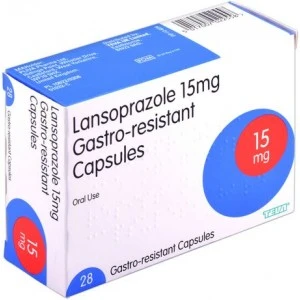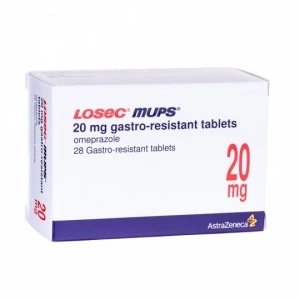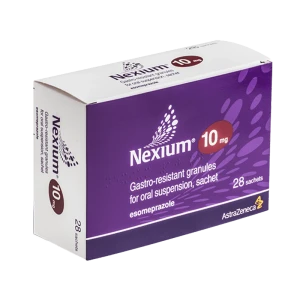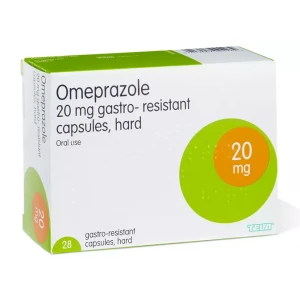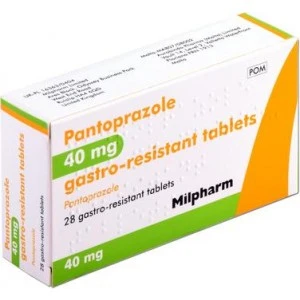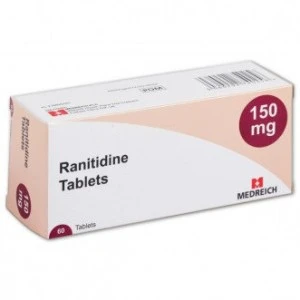Heartburn
While heartburn is an unpleasant and sometimes painful condition, there are several treatments and preventive measures that can help alleviate it.
Lansoprazole
- Reduces stomach acid
- Taken once daily
- Relieves heartburn symptoms quickly
Losec
- Treats heartburn and GORD
- Capsules or tablets
- Consultation with an online doctor
Nexium (Esomeprazole)
- Prevents heartburn
- Lasts 24 hours
- Can be taken with or without food
Omeprazole
- Decreases stomach acid
- A variety of doses
- Effective against heartburn symptoms
Pantoprazole
- Easy-to-swallow tablet
- Taken once daily
- Treats and prevents heartburn symptoms
Ranitidine (Zantac)
- Fast acting
- 12 hours of relief
- Relieves heartburn and indigestion
Zoton FasTab
- Dissolves on the tongue
- Fast acting
- Branded lansoprazole from Pfizer
What is heartburn?
Heartburn, also known as acid reflux or Gastroesophageal Reflux Disease (GORD), is a condition in which stomach acid is regurgitated and backs up in the oesophagus.
This can cause a burning feeling in the centre of your chest. An unpleasant sour taste or smell may linger in your mouth for some time after experiencing heartburn, and your voice may become hoarse and scratchy. You may develop a cough afterwards, though these symptoms usually pass briefly.
In some cases, heartburn can cause nausea and vomiting.
Where the oesophagus joins the stomach is a collection of muscles known as the lower oesophageal sphincter (LOS). This muscle acts like a gate. When we swallow food, the LOS opens so that the food can enter the stomach. The stomach releases acid, and the sphincter closes, preventing the acid from travelling up the oesophagus during digestion.
Damage to the LOS can cause it to function incorrectly, resulting in the LOS remaining open when digestion begins. In this scenario, stomach acid can escape the stomach through the oesophagus. Unlike the stomach, the oesophagus is not equipped with cells which can neutralise the strong stomach acid by secreting an alkali. As a result, stomach acid burns the oesophagus, causing pain.
Chronic heartburn (GORD) can cause irreversible damage to the cells in the oesophagus and increases the risk of developing more serious conditions such as Barrett's oesophagus or oesophageal cancer.
For people with asthma, GORD can exacerbate symptoms and may affect the quality of their breathing. Speak to your doctor if your gastroesophageal reflux is affecting your asthma for further advice.
What causes heartburn?
It's not always clear why heartburn happens to some people, though diet and lifestyle factors can be the cause of the condition or exacerbate symptoms. A common cause of heartburn is indigestion (dyspepsia). When indigestion is suspected as the cause of acid reflux, other symptoms such as nausea (feeling unwell), belching, and bloating may also be present.
The following foods can cause acid reflux:
- Acidic foods
- Alcohol
- Chocolate
- Coffee
- Fatty foods
- Spicy food
Other factors which contribute to acid reflux and heartburn include:
- Anxiety
- Hiatus hernia
- Medicines (such as NSAIDs like Ibuprofen)
- Pregnancy
- Smoking
- Stress
You may find that your symptoms worsen after eating. Lying down and bending over may also exacerbate symptoms, increasing the likelihood of stomach acid travelling up your oesophagus.
How to treat heartburn?
There are multiple treatments for heartburn. Some treatments are available over the counter at pharmacies. Other treatments, such as pantoprazole, require a prescription.
If you experience heartburn regularly, you should speak to your doctor. They will be able to determine the cause of your heartburn and determine the most suitable heartburn treatment for you.
Proton pump inhibitors (PPIs) are often prescribed for chronic GORD and heartburn. This group of medicines prevents the stomach from making excessive acid during the digestion process.
Other antacids, such as Rennie and Gaviscon, neutralise the excess acid in the stomach.
You can buy heartburn treatments online from Prescription Doctor. To begin your order, please complete our online medical form, which will be reviewed by one of our doctors. If your order is approved before 3 pm on a weekday, our UK-based pharmacy can dispense and dispatch heartburn medicine straight to your door.
All items are dispatched in discreet packaging via a next-day delivery to ensure your privacy.
How can I prevent heartburn?
In many cases, heartburn can be prevented by changing your lifestyle, such as adjusting your diet or quitting smoking. If your symptoms are particularly disruptive to your daily life, consult your doctor about available treatment options.
It may be a good idea to record your bouts of heartburn in a diary. Keeping a record of your symptoms can be valuable to both yourself and your doctor in determining possible acid reflux triggers. You should include the following:
- The date and time your symptoms occur
- How long have your symptoms lasted
- How painful the symptoms were on a scale from 1 to 10
- Whether you experienced coughing, burping, difficulty breathing or swallowing
- The food you ate before the symptoms developed
- The activities you did before experiencing your symptoms
Adjusting your eating habits may help to mitigate your symptoms. Eating habits go beyond what you eat and encapsulate how you eat. Aim to eat at regular intervals during the day and balance your portions accordingly. If you have a later lunch, consider eating a breakfast that consists of slow-releasing energy, such as whole-grain cereal or oats. Avoid fizzy drinks and foods which contain a high amount of refined sugars, such as sickly sweet desserts, as they can contribute to your symptoms. Each meal should provide enough energy until your next meal. When eating a meal, sit down and slow down. Chew your food properly before swallowing, and sit down while eating to aid digestion. Take into account your post-eating habits - what do you do after eating? You should wait at least an hour after eating a meal before exercising. If you take a nap after eating dinner, you may need to adjust your resting position to prevent acid reflux.
The NHS recommends adjusting your bed so your head is higher than your waist. One way to achieve this is to prop your head and shoulders up on pillows. This will reduce the chance of stomach acid entering your oesophagus while resting.
Numerous studies have indicated that sleeping on your right-hand side can aggravate heartburn symptoms. It is believed that sleeping on your right relaxes the lower oesophageal sphincter, allowing acid to enter the oesophagus during sleep. Sleeping on your left-hand side, however, may ease your heartburn symptoms.
Other tips for preventing acid reflux include:
- Avoiding or limiting alcohol consumption
- Losing weight if you are overweight
- Avoiding tight clothing around your waist
If you suspect your acid reflux is a side effect of your medication, speak to your doctor or a pharmacist for advice. Always speak to your doctor or pharmacist about any side effects you experience. You should never stop taking a medication unless your doctor has instructed you to do so.
Additional resources
What's the difference between Omeprazole and Lansoprazole?
© 2013 - 2025 Al Muhsineen Limited. All Rights Reserved. Registered Pharmacy: 34 Halliwell Road, Bolton BL1 8RL. Registered Office: 254 First Floor, Shearbrow, Blackburn, England, BB1 8DS

